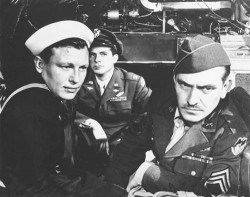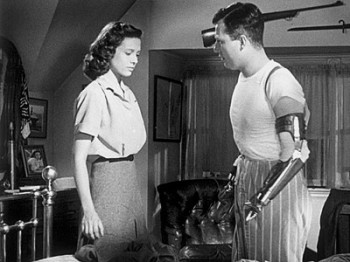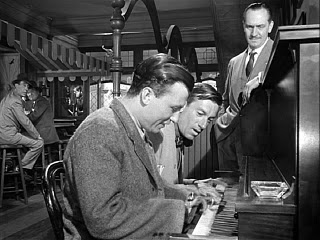Art Art &Commentary 30 May 2010 09:19 am
The Best Years
 - The magnificence of William Wyler‘s film, The Best Years of Our Lives, cannot be overstated. To me, it’s a near-perfect movie. The direction, the script, the cast, the cinematography and the music all done by masters at their peaks blends into an extraordinary film.
- The magnificence of William Wyler‘s film, The Best Years of Our Lives, cannot be overstated. To me, it’s a near-perfect movie. The direction, the script, the cast, the cinematography and the music all done by masters at their peaks blends into an extraordinary film.
When I was 11, this film was about to start on The Late Show, a local CBS late night movie that began at 11:15pm. My father asked me if I wanted to stay up to watch it. He said it was one of the all-time greats. Now, I have to admit I didn’t always agree with what he felt were the all-time greats, but I stayed. Within ten minutes, I was in tears as the three military men return to Boone City, their small home town. The cab drives by the many small stores and houses in the area, and little more than the sight of these passing buildings wells the tears in your eyes as you feel what these three guys are feeling. That Wyler would have accomplished so much emotion in so short a time is extraordinary.
 I stayed with the 2½ hr. film, even though my father fell asleep hours before the end. He was right, it was an all-time great. I’ve since seen the film at least 50 more times. In the past two months, I’ve spent a lot of time at home, recovering from an operation, and have seen many, many movies over that time. Last night, TCM aired it again (the second time in the last two weeks) for Memorial Day. I was pulled into it again, and I’m happy for it.
I stayed with the 2½ hr. film, even though my father fell asleep hours before the end. He was right, it was an all-time great. I’ve since seen the film at least 50 more times. In the past two months, I’ve spent a lot of time at home, recovering from an operation, and have seen many, many movies over that time. Last night, TCM aired it again (the second time in the last two weeks) for Memorial Day. I was pulled into it again, and I’m happy for it.
Wyler, it seems, had absolute patience for long self-explaining scenes. He gave characters plenty of time to pause and think, and their thoughts register fully and loudly to us. It’s amazing business that today’s films (and probably their audience) cannot sit still to watch. With this film, you can see how much you’re missing in that impatience.
 The photography by the great Gregg Toland has to be second only to his work on Citizen Kane. The deep focus imagery is used to pull strong emotion and tell the story more simply. As Homer (Harold Russell) and Butch (Hoagy Carmichael) play chopsticks in the foreground, we’re watching Fred (Dana Andrews) make a desperate and sad phone call far in the distance of the bar. While Homer and Wilma marry to the right of the screen, Fred, in the foreground, is watching Peggy (Teresa Wright) in the distance. There are those scenes of Fred walking among the detritus of the Air Force as hundreds and hundreds and hundreds of fighter planes line up for destruction.
The photography by the great Gregg Toland has to be second only to his work on Citizen Kane. The deep focus imagery is used to pull strong emotion and tell the story more simply. As Homer (Harold Russell) and Butch (Hoagy Carmichael) play chopsticks in the foreground, we’re watching Fred (Dana Andrews) make a desperate and sad phone call far in the distance of the bar. While Homer and Wilma marry to the right of the screen, Fred, in the foreground, is watching Peggy (Teresa Wright) in the distance. There are those scenes of Fred walking among the detritus of the Air Force as hundreds and hundreds and hundreds of fighter planes line up for destruction.
Hugo Friedhofer was a great arranger and song writer. His score for this film stands out as one of the great scores of all time. It carries you through the movie and strengthens the work of every other brilliant craftsman who worked on it. The music is brilliant.
I can’t say enough about this film. It’s Memorial Day, and writing about it gives me a chance to mention the holiday. But I’m certainly honoring what I feel is one of the great films of my life. I hope all of you have, at least, seen it once. If not I urge that you do. I doubt you’ll ever see the likes of it made today.

Photo by Steve Fisher
Remember the troops for Memorial Day.

on 30 May 2010 at 11:10 am 1.Rudy Agresta said …
I ditto everything you said about THE BEST YEARS OF OUR LIVES Michael. I still get chills when I hear the musical score on CD and tears well up whenever I watch the film – even after countless times of listening and watching. Extraordinary talents in those days – sorely missed in today’s way of doing things.
Enjoy your holiday weekend, and get well soon!
on 30 May 2010 at 11:47 am 2.Joel Brinkerhoff said …
My wife and I just watched this recently after I had read about it in a book about great movies. We both were struck with how poignant it still is and made us understand a little more of what our fathers may have felt after their war experiences.
on 30 May 2010 at 1:16 pm 3.Marcus said …
It’s a brilliant film. William Wyler was America’s greatest film director. Even Billy WIlder thought so! More best picture oscars than any other director.
Read the great book “A Talent for Trouble,” about Wyler. Best book out there on him.
on 30 May 2010 at 9:24 pm 4.Richard Cady said …
I look at your site every day. What a surprise to find your tribute to BEST YEARS today. In some circles of movie criticism Wyler’s considered passé but I’ve always believed he is among the very best directors.
I too saw it when I was very young –– in the early fifties when I was ten –– at the Liberty Theater in Providence, RI. My younger brother and I paid only 10 cents each for a double bill with SANGAREE starring Fernando Lamas and Arlene Dahl. The scene in the airfield with Andrews is the one that impressed me the most.
Thanks for your very apt appreciation of one of my all-time movie favorites.
on 31 May 2010 at 3:13 pm 5.Marcus said …
I’d like to know what circle of movie criticism Wyler’s films are considered “passe’.” That’s an idea I’ve never run across anyone would agree with.
on 01 Jun 2010 at 12:24 pm 6.Richard Cady said …
For Marcus –– a couple of assessments that speak to Wyler’s falling reputation over the last few years:
… but in the 1960s, Wyler’s critical reputation began to tumble. Increasingly, his restraint came to be seen as frigidity, his oeuvre was taxed as academic and bloodless, and it was argued that his pictures were more significantly influenced by co-workers (notably producer Samuel Goldwyn and the great cinematographer Gregg Toland) than by any identifiable style or thematic consistency. Although Film Forum’s 34-film retro is not likely to pop him back on the throne, it does include some rarely seen and underrated plums, among them archival prints of Wyler’s intriguing first sound pictures, and could jump-start a few reappraisals.
Elliott Stein, The Village Voice, Sept. 10, 2002
William Wyler presents a classic example of the director dethroned by the shifting of cinematic fashion, damned for those very qualities for which he once was praised. His restraint can be seen as frigidity, good taste as complacency, seriousness as pomposity, technical accomplishment and clarity as bland dullness….David Thomson, citing Orson Welles’ not wholly complimentary description of Wyler as “a brilliant producer,†stated that “Wyler has no cinematic personality, no abiding thematic interests and no proper grasp of camera language….[His] films are put together like budgets: neatness and balance stand in for insight.†His alleged lack of clear thematic preoccupations has often been adduced as the ultimate proof of Wyler’s failure to achieve auteur status.
Of recent years, there have been signs that Wyler’s reputation may be recovering a little. Andrew Sarris, revising his earlier “harsh judgment,†conceded that Wyler had “demonstrated time and again that the movies of a good craftsman are infinitely preferable to those of a bad artist.â€
Philip Kemp, World Film Directors, Vol. I
I also remember being totally stunned a few years ago when one of the pop entertainment mags did a Best Directors list and left Wyler out.
on 02 Jun 2010 at 12:27 pm 7.bill burg said …
I first saw this film on TCM one summer night a couple of years ago. No film I’ve seen since I was a teenager has moved me more. So glad to find some like-minded folks in the animation world to share it with. Many thanks, Michael.